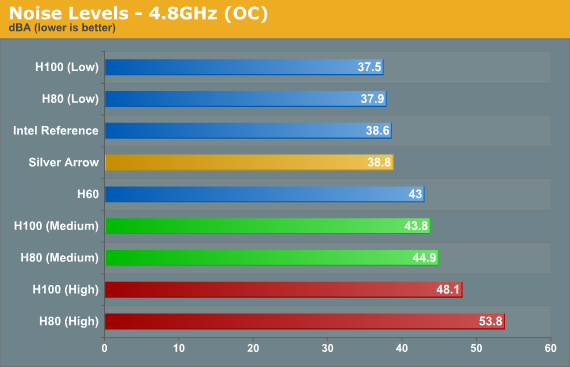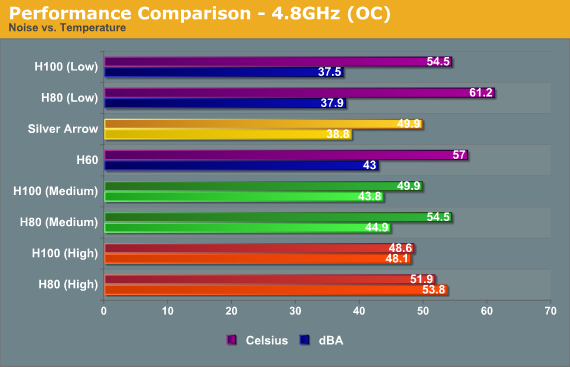Corsair Hydro Series: H60, H80 and H100 Reviewed
by Jared Bell on November 7, 2011 12:00 AM EST- Posted in
- Cases/Cooling/PSUs
- Corsair
- Water Cooling
Noise Results
Due to the built-in variable fan controller on the H80 and H100, testing the noise on these two coolers proved to be challenging. Our test system, even when overclocked to 4.8GHz, didn't generate enough heat to max out the RPM on the H100 high speed test. When plugged into a direct power source, the H100 fans were barely, but noticeably, louder than when powered by the controller on the high setting. We opted to power the fans as intended using the built-in fan controller, but it should be noted that these fans could be slightly louder if directly powered or used in a hotter system/environment. The H80 appears to hit max RPM on all tests, while the H60 is forced to 100% with it having the only PWM fan in the bunch.

The H100 and H80 when set on low speed are neck and neck for the quietest coolers of the bunch, beating even the virtually silent Silver Arrow and Intel reference cooler. The H60 with its slower RPM fan barely edges out the H100 and H80 when they're set to medium. The H100 and H80 when set on high speed top the charts here, as we would expect. While the H80 and H100 sport the same fans, but the H100 comes in quieter. This is most likely due to our test system not being hot enough for the H100's fans to fully kick in.
Here we finally see the penalty for the excellent cooling capability of the H100 when it's running on high speed. As you can see, it's quite loud at this setting. Let's take a look at the noise graph again, but this time we'll overlay the temperature graph to get a better idea on how nose and performance are related.

For the most part, the better the performance, the louder the cooler. Ultimately, it's up to you to decide what the perfect balance of cooling performance and noise acceptance is for your particular situation.










91 Comments
View All Comments
mach2plus - Monday, January 23, 2012 - link
"why do the big honking air coolers consistently outperform the sealed water cooling units?"What testing are you referring to? I have read reviews of the H80 and H100 here and elsewhere, and your comment just doesn't seem to make any sense...
please elaborate on your claim and cite facts, please.
johnyfriend - Monday, November 7, 2011 - link
Went with the Antec Kuhler than with Corsair as the Corsair one was not so quiet...Happy with Antec now...jigglywiggly - Monday, November 7, 2011 - link
What happened to all the other coolers? Like the thermalright ultra 120 x, this test is useless atm without better comparisons.Beenthere - Monday, November 7, 2011 - link
The test data clearly shows no cooling advantage to the Corsair closed loop water-coolers and they are a poor value compared to quality HSFs. Open loop coolers costing >$185 have some merit if you like to tinker and want to do some more extreme OC'ing, but water-cooling for PCs in general is hardly worth the cost and trouble. It only takes one leak to fry your PC hardware. A quiet, single fan Xigmatek Aegir costing $70. will deliver as good of or better performance than the Corsair water coolers.http://www.frostytech.com/top5heatsinks.cfm#INTELH...
LancerVI - Monday, November 7, 2011 - link
Spoken like a true non-enthusiast. I have been water cooling for 10 years and haven't had one problem. While I'm no fan of closed loops like this, I can assure you that my open loops performance far exceeds this.Don't base your judgement of water cooling on this limited closed loop, your lack of knowledge and your fear.
Beenthere - Monday, November 7, 2011 - link
As I said open loop cooling systems costing far more are OK if you want to do serious OC work but they are not a good value and one leak can cost you dearly. Just because you system has not leaked does not mean other's have not destroyed hundreds of dollars in PC hardware. My comments are far more objective than most folks who are in one camp or another.Death666Angel - Monday, November 7, 2011 - link
Yes, current generation normal air coolers are pretty great. But they also cause trouble with their size. Some (14cm+ height) may not fit in certain cases. On some motherboards, their width can result in RAM with larger heatsinks not fitting, blocking the first PCIe slot or interfering with HDDs.For all these purposes, AIO water cooling is a great alternative if powerful cooling is still desired.
I had a Noctua C12P in my Lian Li V-351B, because it was the biggest thing that could fit (height restricted by the PSU hovering over the CPU socket). It is okay, but not great (OC very much heat restricted and loud once I go for full load). A friend of mine has the H50 and has the radiator on one of the front intake fans. He can run it silently and much, much cooler as well.
I personally just bought components for a full blown water cooling setup, mostly because I need something to tinker with (file server and new HTPC are done) and I want better OC/lower noise. Though it cost an arm and a leg. :D
JPForums - Monday, November 7, 2011 - link
<quote>On some motherboards, their width can result in RAM with larger heatsinks not fitting ...</quote>I was thinking the exact same thing. While I certainly haven't used the majority of motherboards out there, I have worked with a pretty sizable cross-section (for one person). The above statement is true of every Core i-series and Athlon64 or newer board that I've worked with. This typically only applies to the first slot. Though in many cases, if you want to maintain optimal multichannel capabilities, you loose out on another (two for triple channel controllers).
I ran into this problem with the Thermaltake Frio, several Thermalright coolers, Prolimatech Megahalems, and several Noctua coolers including their 90mm NH-U9F. In fact, some of these coolers with less vertical clearance block the usage of RAM regardless of height.
beginner99 - Monday, November 7, 2011 - link
Yeah I agree with Jared. I have a NH-D14 and it is sometimes annyoing because it blocks so much space I often have to remove it just for some minor change in my setup.Tetracycloide - Monday, November 7, 2011 - link
On the other hand the NH-D14 offers significantly better delta to noise ratios. In my experience mine has certainly been worth the extra hassle of dealing with a large fin assembly every time I open the case because of how well it performs when the case is sealed.